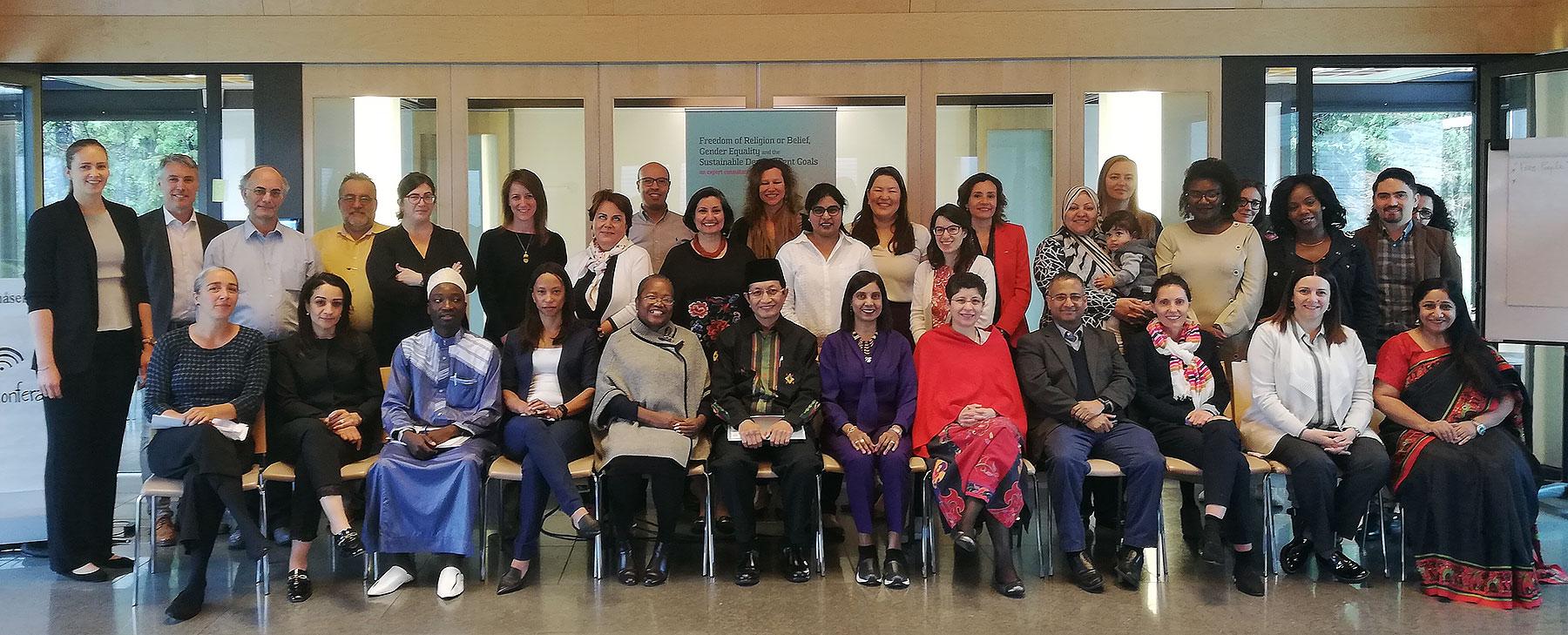Bridging the gap between gender justice and religious liberty

Participants at the Oslo workshop on Freedom of Religion and Gender Equality. Photo: Stefanus Alliance
LWF takes part in consultation aimed at keeping women’s rights at the heart of efforts to uphold freedom of religion and belief
(LWI) - A woman kneels on an empty stage, bowing her veiled head in prayer. An activist for religious freedom enters on one side and a gender justice campaigner on the other. Both try to pull her in opposite directions.
This simple sketch set the backdrop for a recent meeting in Oslo on improving the relationship between those working on Freedom of Religion and Belief (FoRB) and those engaged in Gender Equality efforts. The 24-25 May workshop was organized by the Danish and Norwegian governments, through the Danish Institute for Human Rights and the Stefanus Alliance, in partnership with various United Nations offices.
The Lutheran World Federation (LWF) joined around 30 other Faith Based Organizations (FBOs) to discuss the intersection between the right to religious freedom and women’s rights, within the framework of the UN’s 2030 Sustainable Development Goals. The meeting focused on gathering best practices and proposing concrete actions to ensure progress in education (SDG4) and in conflict prevention and access to justice (SDG16), while keeping gender justice at the core of this effort .
The LWF’s María Cristina Rendón shared examples of building capacity to strengthen women’s human rights among LWF’s member churches, country programs and partners from a faith perspective, aimed at achieving a more gender-sensitive approach. She also stressed the LWF’s commitment to the 2030 agenda through its Waking the Giant initiative, where faith actors are equipped with tools to play a pivotal role in “leaving no-one behind”.
The UN’s Special Rapporteur on FoRB, Ahmed Shaheed, stressed the importance of including all stakeholders at leadership and grassroots level, reiterating that FBOs have a crucial role to play in the fields of advocacy, capacity building and research. He noted that without a rights-based approach to religious freedom, the value and dignity of women and girls can be subordinated to a regressive religious agenda.
Another UN representative, Azza Karam, who serves as senior advisor at the United Nations Population Fund (UNFPA) and chair of the Inter-Agency Task Force on Religion and Development, said: “Gender issues are the quintessential dimension that measures commitment with human rights. It is there that you will find most divergences”.
Gender issues are the quintessential dimension that measures commitment with human rights. It is there that you will find most divergences.
Participants from many countries and faith traditions shared examples of the harmful ways in which religion is used to justify discrimination and violence, through legislation on family life, divorce, inheritance or child custody, as well as harmful practices including early marriage and female genital mutilation. They noted that efforts to challenge such practices are often labelled as “Western interference” with traditional cultures and belief.
Indian professor Saumya Uma from Ambedkar University in New Delhi spoke of efforts to overcome the explosive mix of patriarchy, religious fundamentalism and the caste system in her country which hinder women’s access to their rights and dignity. She highlighted the economic factors which form a further barrier for women seeking access to India’s justice system.
Theologian Nayla Tabbara, from the Adyan Foundation in Lebanon, explained how different Muslim and Christian groups in her country implement their own legislation regarding the family and women’s rights. The Evangelical Lutheran Church in Jordan and the Holy Land was held up as an example of faith communities contributing to the achievement of SDG 16 on access to justice by reforming its legislation on the family to remove any discriminatory provisions towards women and seeking to implement the LWF’s Gender Justice policy.
Another positive example is an interchurch platform in Colombia, DiPaz, which is supported by the LWF. It brings together different denominations and groups to discuss difficult issues of justice and human rights, including gender equality. In the context of political polarization and the renegotiation of the peace agreement, DiPaz provides a vital space where conversations around religious freedom and women’s rights can continue to take place.
The next steps of this consultation process will include the drawing up of a collection of best practices. Another workshop will be held in the second half of 2019, focusing on good health and well-being (SDG 3) and on climate action (SDG 13), maintaining gender equality at the heart of the analysis and proposed actions. The process will culminate in 2020 with recommendations for different stakeholders and the thematic report on gender equality by the UN Special Rapporteur on FoRB.




